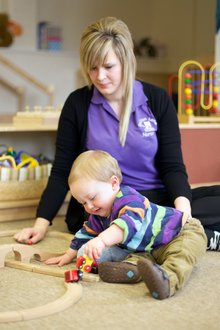During National Epilepsy Week we look at what this condition can mean for your child, and how you can help.
Witnessing your child having an epileptic seizure for the first time can be terrifying and upsetting. And unless there is a history of epilepsy in the family, many parents might not even realise at first what is happening to their child.
Epilepsy is a common condition that causes seizures. These ‘fits’ can take many forms and are caused by bursts of electrical activity in the brain that affects how it works. In some children this may mean falling to the floor and having jerky movements, while in others it can manifest with split-second staring into space or experiencing a strange taste in the mouth.
Sometimes febrile seizures, or convulsions, which happen when a child has a fever, and usually occur in youngsters between the ages of six months and three years, are mistaken for epileptic fits. Both may result in twitching of the limbs.
Where children have a history of febrile seizures is an increased chance they will have epilepsy later in life. However, despite some similar symptoms, they are different conditions.
Sometimes, a child may be fully aware that they are having an epileptic seizure, while for others they realise only after the episode has passed. Most seizures subside in the few minutes, and some last just a few seconds.
More than 600,000 – or one in every 103 people – in the UK have a diagnosis of epilepsy and many will have discovered in childhood that they have the condition. Official figures show that one in every 240 under-16s in the UK has a diagnosis of epilepsy.
Recognising epilepsy
Jago Peterson’s parents noticed from a young age, that their son would have momentary seizures – known as absence, or petit mal, seizures - that resulted in him staring for a few seconds into space.
“The staff in his early years settings also noticed this,” said Jack, his father. “Jago would ‘be there’ one minute, playing or taking part in an activity, but then would just stop and stare. Then it would pass after a few seconds as if nothing had happened. It was easy to miss if you weren’t looking for it, but by the time we were referred to the consultant this was happening several times a day.
“The doctors diagnosed a form of epilepsy called absence seizures and Jago now takes medicine every day - though he is expected to grow out of this by the time he reaches his teens.”
Epilepsy is easier for neurologists to diagnose if there is a history of the illness in the family, the child suffered an infection as a baby or there was a head injury in early childhood. In many cases, the cause of a child’s epilepsy may never be confirmed.
Some researchers now believe that the chance of developing epilepsy is probably always genetic to some extent, and that anyone who starts having seizures has always been prone to doing so.
Parents can help doctors to make a diagnosis and establish how their children are affected by observing the ‘seizures’ and reporting back on what happens. They may, for example, be asked by doctors to take a video of their child having a seizure as this may help arrive at the correct diagnosis and the prescribing of the most appropriate medication. Doctors may then refer the child for further tests, such as a brain scan.
Different types of seizure
There are two main types of seizure: focal seizures (also called partial seizures) and generalised seizures. Focal seizures affect only one side of the brain while generalised seizures affect both sides. Some seizures are more common in children than adults.
If your child is diagnosed with epilepsy they will probably be prescribed an anti-epileptic drug (AED) to control their seizures, and doctors will discuss with you the best option for your child. AEDs stop seizures from happening, but they do not cure epilepsy.
Like all drugs, AEDs can cause side effects for some children, which may subside in time, or might require the dosage to be adjusted. If the AEDs don’t work, your doctors may consider other ways of treating the condition. Occasionally, a special diet might be recommended.
Some children’s epilepsy is brought on by triggers such as stress, excitement, boredom, missed medication or lack of sleep. Once you recognise the triggers you can help your child avoid them.
Experts believe that getting enough sleep, and well-balanced meals, will help keep your child healthy and may help to reduce their seizures.
Further reading
epilepsysociety.org.uk/epilepsy-childhood
Written by Dorothy Lepowska-Hudson for the Pre-school Learning Alliance
This article is for information purposes only and should not be used as a substitute for professional medical help. If you or your child is unwell you should consult a medical professional.
Where next?
How do I soothe my colicky baby?
Healthy lunchbox ideas for your pre-schooler







